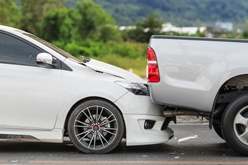
Many people do not take rear-end motor vehicle accidents very seriously, even calling them “fender benders” as if being in one is no big deal. Yet, these very common accidents cause serious injuries that can cause lifelong changes to a person’s life. According to the National Traffic Highway Safety Administration (NHTSA), rear-end collisions were the leading cause of injuries in vehicle wrecks in 2013—with 503,000 injuries—and caused 1,806 deaths. If a negligent driver causes you to suffer injuries in one of these accidents, you do not want to take your injuries lightly. Your injuries could be much more severe and long-term than you might first think. You may be able to hold the person who caused your accident accountable for compensating you for your injuries.
Common Causes of Rear-End Collisions
A rear-end collision occurs when one vehicle’s front end hits the back end of another vehicle. While not always the case, these accidents are often caused by the negligence of the driver in the rear. Common reasons that these crashes occur include:
- Distracted driving. A driver taking his eyes and mind off his driving for just a few seconds to talk on a cell phone, text, or look at a GPS can find himself unable to avoid crashing into the rear-end of a vehicle who suddenly slowed or stopped. Eating and drinking, fiddling with instrument controls, and being too engrossed in conversations with passengers are other common forms of distracted driving.
- Tailgating. When a driver is tailgating, he is violating Georgia’s traffic laws that require drivers to maintain a safe distance from other vehicles and is much more likely to cause a crash. In addition, drivers who tailgate are often speeding, making the force of the impact even greater and the injuries more severe.
- Impaired driving. If a driver is intoxicated due to consumption of alcohol or drugs, his reaction time and driving abilities are impaired. He may not even be aware that the driver in front of him is slowing down or stopping before it is too late.
- Not driving for weather conditions. Drivers must slow down when weather conditions, such as snow, ice, fog, and rain, require it. When drivers do not do this, they can easily lose control of their vehicles and crash into the rear end of the car in front of them, sometimes causing a multi-vehicle crash.
- Road defects. In some cases, road defects, such as potholes, hidden traffic signs, and non-working traffic lights can be the cause of a rear-end collision.
- Speeding. A driver who is speeding needs more time to slow down or stop. This can be impossible, especially if the driver is driving too fast around curves or when trying to make it through a changing traffic light.
- Drowsy driving. A drowsy driver may not be alert enough to realize that the vehicle in front of him is slowing down or stopping. Even worse, the driver could fall asleep for a few seconds, with a collision being the result.
- Construction zones. When speeds slow or come to a standstill in a construction zone, negligent drivers who are speeding or tailgating other vehicles may not have time to stop or reduce their speed.
Injuries Caused by Rear-End Collisions
Even “minor” rear-end collisions at busy intersections in the Atlanta area can cause victims to suffer devastating injuries that can result in permanent disabilities. Other crashes on our congested highways where vehicles are traveling at faster speeds can cause more catastrophic injuries or even death. Common injuries victims suffer include:
- Fractured facial bones and broken jawbone
- Traumatic brain injuries—sometimes causing permanent damage to a person’s reasoning, mental abilities, vision, hearing, and more
- Damage to a victim’s teeth
- Whiplash, or back and neck injuries that can result in chronic pain and limitations of the victim’s work abilities and day-to-day activities
- Crushed limbs and broken bones
- Internal organ damage and bleeding—which can be life-threatening
- Serious burns
- Spinal cord injuries, including paralysis
Were you or a family member injured in a rear-end collision caused by a negligent driver? Start an online chat today to schedule a free consultation to learn more about your legal options and to get your questions answered.
Related Links:














